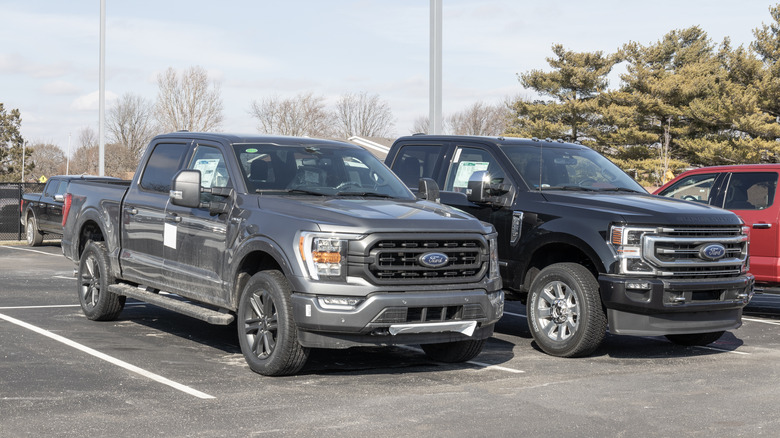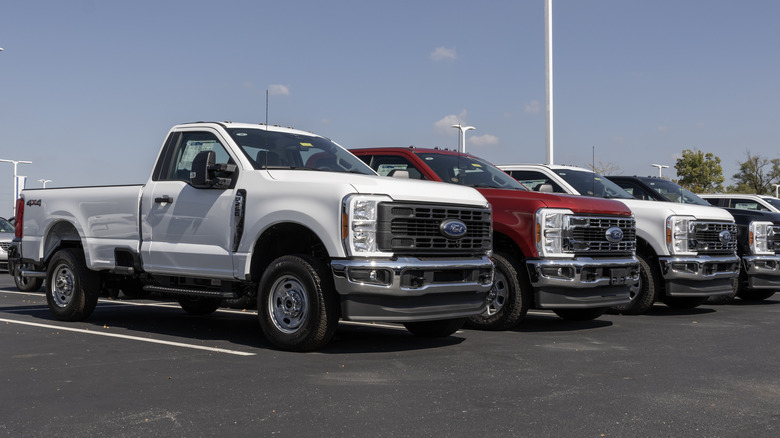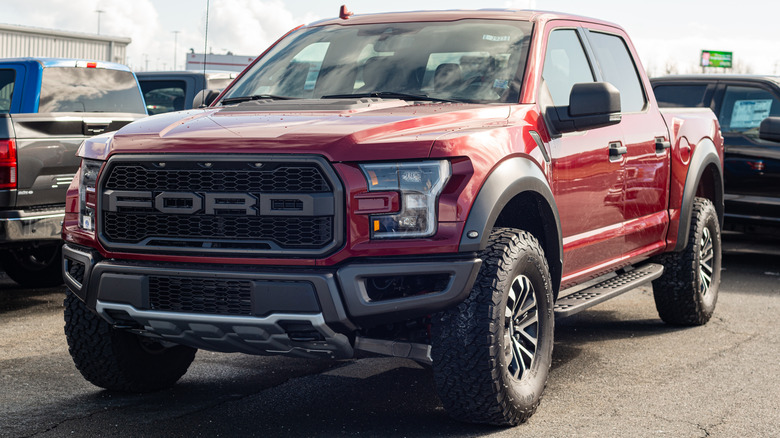F-150 Vs F-250: Big Differences To Know Before You Buy
Ford's F-series is America's best-selling line of trucks and has held that title for over 45 years. But there's more to the Detroit-built workhorses than first meets the eye. You're likely familiar with the Ford F-150. That's the best-selling truck in the lineup and, consequently, the one you're most likely to encounter on the street. It's large, comfortable, and practical.
The series debuted in the 1940s and has managed to fend off competition from rival Dodge's popular RAM lineup and Chevvy's Silverados over the past few decades. Ford's popular pickup hasn't just dominated domestic competition. It also came out on top against highly related imports like the Toyota Tacoma and the Nissan Titan. It even outsells the notoriously indestructible Toyota Hilux. The F-150 may be the go-to pick for many, but there are plenty of other trucks in the series, including an F-250, an F-350, and even an F-450.
Obviously, the larger numbers suggest a difference, but what might that difference be? With other vehicles, the numbers can refer to engine capacity, designate between compacts, sedans, and SUVs, or even separate regular models from special editions. With the F-series of trucks, it's all pretty straightforward. This article will focus on the differences between the F-150 and F-250, as the differences further down the line are essentially the same — just more exaggerated.
There's a difference in practicality
Despite its size and practicality, the Ford F-150 is classed as a "light-duty" half-ton class truck. This isn't a label Ford slapped on there; it's actually a government specification. The F-150's gross vehicle weight rating is under 8,500 pounds, hence its designation. The F-250, on the other hand, is above that threshold and classed as a three-quarter ton, heavy-duty truck.
The differences go far beyond classification. The F-150 is far more practical for everyday life and can provide a more comfortable and stable ride at highway speeds. It's also smaller and less of a pain to drive around cities. Although fuel economy is probably low on the list of priorities for truck owners, it is more efficient than the F-250. The smaller truck is packing some variety of eco-boost V6, while the F-250 will likely have a large V8 PowerStroke engine.
At the top end, the F250 has a 6.7-liter engine capable of producing 475 horsepower and 1,050 pound-foot of torque. The best an F-150 can manage is a high-output eco boost that can almost match the horsepower of the F-250 but only packs around half the torque.
Where the F-250 excels is on the job. It is a larger vehicle with more torque, horsepower, and robust suspension. As a result, it can tow more and handle a larger payload than its little brother. F-150 owners know their vehicle is pretty handy when it comes to hauling and carrying things — so the F-250 is likely overkill for the majority of drivers.
There's a price difference too
The extra grunt you get from a Ford F-250 doesn't come cheap. The exact difference in price will vary by dealership, but on average, you're probably looking at an extra $10,000 if you want to opt for the heavy-duty truck. At one dealership we checked, the F-150 starts at just under $34,000, while the F-250 is a shade under $44,000.
As for if it's worth the money, that depends on what you need the truck for. There's a fair argument that the vast majority of American pickup truck owners don't actually need a pickup truck. They only own something like an F-150 because they like that style of vehicle. The design of most modern pickups reflects this. The bed size, which is the practical part, remains the same or has even shrunk when compared to F-150s from 40 years ago. However, the cab has gotten far larger and more comfortable.
If you just like pickup trucks, the F-250 is overkill, and the extra money is better spent on optional extras that will make an F-150 more comfortable. You could also put the price difference towards an upgrade to something like the F-150 Raptor, which again will be more useful than an F-250 in most cases. If you have a profession or hobby that requires an F-250, then it is worth the money, as an F-150 won't cut it.


